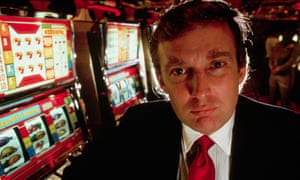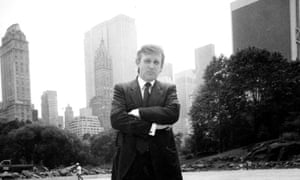When Donald Trump
became a presidential candidate, Susan Mulcahy got a call from a former
colleague at New York Newsday. “You’d better stock up on valium,” the
ex-colleague said.
“It’s because I hated him so much,” said Mulcahy, the veteran gossip columnist who covered Trump for years at the New York Post, describing the call. “I would go ballistic if his name was mentioned in the office.”
Trump’s reputation as a liar now precedes him, but this week it reached new heights. In addition to reports that he regularly brags about winning the votes of a majority of American women – he did not – other accounts say that he has begun questioning the authenticity of the Access Hollywood tape in which he boasted about grabbing women’s genitals.
It’s an over-the-top falsehood (the hosts of Access Hollywood have reiterated that the tape is authentic) but to Mulcahy, it is just par for the course with Trump. “Most people have an alibi or a backup plan; Trump doesn’t do that,” she told the Guardian. “He just says the exact opposite of what he did five minutes ago.”
No one can argue that Mulcahy didn’t warn them. “He’s a pathological liar. I’ve said that repeatedly and I’ve been saying it since the 80s. He has two sports, golf and lying, and that’s it. He just lies about everything.”
“It’s because I hated him so much,” said Mulcahy, the veteran gossip columnist who covered Trump for years at the New York Post, describing the call. “I would go ballistic if his name was mentioned in the office.”
Trump’s reputation as a liar now precedes him, but this week it reached new heights. In addition to reports that he regularly brags about winning the votes of a majority of American women – he did not – other accounts say that he has begun questioning the authenticity of the Access Hollywood tape in which he boasted about grabbing women’s genitals.
It’s an over-the-top falsehood (the hosts of Access Hollywood have reiterated that the tape is authentic) but to Mulcahy, it is just par for the course with Trump. “Most people have an alibi or a backup plan; Trump doesn’t do that,” she told the Guardian. “He just says the exact opposite of what he did five minutes ago.”
No one can argue that Mulcahy didn’t warn them. “He’s a pathological liar. I’ve said that repeatedly and I’ve been saying it since the 80s. He has two sports, golf and lying, and that’s it. He just lies about everything.”
“I wanted to be a writer and newspapers seemed like one place where you could do some writing and make a living,” Mulcahy said.
What she would learn put her on the frontline of the problem reporters everywhere are confronting now in covering Trump – she just had a 30-plus year head start in dealing with it.
Though she covered a lot of over-the-top personalities, even among New York City’s drama-prone elite, Mulcahy said Trump stood out. Specifically, he stood out for the audaciousness and consistency of his lies.
Trump has changed parties and careers and wives, but his estranged relationship with truth is remarkably consistent. “I don’t think it has evolved,” she said. “I don’t think he’s changed much. What you’re seeing now is what you saw 30 years ago.”
In her 1988 book documenting her time at Page Six during a period when Trump’s star was ascendant, Mulcahy devotes half a chapter to the future president’s fondness for falsehoods, be it about anything from his real estate deals to whether he was meeting with Richard Nixon.
“No matter how well wired a gossip columnist is, there are those who will try to snip those wires,” Mulcahy wrote at the time. “Of all the wire cutters I’ve encountered, Donald Trump carries the sharpest instruments.”
Not that she realized he was a liar at first.
“It happened gradually,” she said of the realization. “I wrote about him because he was this oversized figure. New York is a city of great characters and Donald Trump is – I hate to say this – a great character. I covered him but as time went on, I got snarkier.”
And though over time she pared back her coverage of him, to some extent, ignoring Trump was easier said than done.
The particulars of her Trump stories are damning.
After a source tipped her off to a meeting between Trump and Nixon and she called to confirm it, for instance, Trump didn’t just evade the question: he totally denied it. “‘Nope, didn’t have a meeting with Nixon,’” she recalled him saying. “Then,” she added, “Nixon’s office confirmed it.”

“Why lie about that? What difference does it make?” she asked of Trump’s denial.
“He has become so used to getting away with everything that the fact that he lies about everything clearly doesn’t bother him: he knows it’s going to roll off his back,” she said.
Another time, when she and a colleague went to Trump Tower to interview Trump, he told her nothing was happening with a real estate deal she had been writing about. The next morning, the New York Times ran a big story about the Lincoln West development, citing a conversation with Trump the same day he told Mulcahy there was no story.
“‘I had a deal with the Times,’” she recalled Trump telling her in her book. “‘I was going to call you today and tell you about it.’”
Even now, some 30 years later, Mulcahy is still stunned by the audacity of the lie.
“People skirt the truth, they play games, they don’t call you back, but the way he lied I had never experienced before,” she said. “It was so over the top and it was so arrogant. He’s a narcissist beyond description. Every day I get up, look at the paper and can’t believe he’s president. It is such a joke to me.”
But given his background and training from the late Roy Cohn – the reviled but highly successful defense attorney who rose to political prominence as a legal adviser to the late Senator Joseph McCarthy – perhaps she shouldn’t have been surprised.
Mulcahy frequently interacted with Cohn at Page Six and though she didn’t exactly relish the relationship, next to Trump, he seemed like a paragon of truth-telling.
With Trump, “you had to double and triple check everything”, she said. “If it was a good story, it was worth doing the extra work, but half the time it would turn out to be a lie. Roy didn’t lie like that.”
Even before 2016, Mulcahy assumed Trump was running in much the same way he’d run or threatened to run before: as a publicity stunt to promote his new casino or circus act du jour. She had plenty of company in being surprised by the outcome. “I think he’s shocked he won,” she said.
Faster-moving news cycles haven’t curbed Trump’s propensity for lying, either.
“Everything he says has to be checked and it’s very difficult in the age of the internet,” Mulcahy said. “When I was writing you could have an hour or two before your deadline. Now you’ve got to publish it immediately, if he says something outrageous. But everything still has to be checked – everything.
“A lot of people, particularly Trump supporters, they’re not reading their local newspaper – they’re watching Fox News, where instead of Roy Moore you’ll just see Al Franken and a jokey photoshoot he did with Arianna Huffington,” she said. “If you’re a person who supports Trump, you’re paying attention to that. You’re not looking at CNN.”
But Mulcahy, who gleaned her insights into reporting on Trump the hard way, does have some thoughts for those charged with covering the president today.
“Donald Trump should be treated like a very, very bad child in a preschool. Like the kid in preschool who really wants attention, so he throws his excrement against the wall? That’s Trump on Twitter.
“Bury the absurd outbursts and cover what is really happening. Don’t cover his personality and his statements on Twitter, because they’re ridiculous.”
Mulcahy said she wished there were a way to cover the actions of Trump’s administration without covering Trump himself. “He would lose interest in the whole thing, as soon as it wasn’t all about him,” she said. “He would lose interest in being president if you just covered those actions.”
For instance, she said, it was no coincidence that when hurricanes were pounding the Gulf, Trump was busy tweeting about players kneeling at NFL games. “He wants people not to pay attention to the fact that his government is not doing a good job of hurricane cleanup,” she said. “He’s very good at redirecting attention.”
She is damning about what she see as the president’s narcissism.
“He’s so excited to turn the TV on – it’s Donald everywhere and that’s all he wants,” she said. “He didn’t get into office with a plan, like: I want to accomplish these things. He just wanted to win – just like he wanted to make a major real estate deal and get the most tax abatements or whatever.”
She added: “He has no policies or theories, just a desperate, endless need for attention.”
Thirty years after she first began dealing with Trump, her observations remain apt.
“I certainly did not envision my comments about his lying to become relevant in this context so many years later,” she said. “I thought he would be a lounge act in Atlantic City about now. If so, he’d be happier, and the rest of us would have much less to worry about.”

No comments:
Post a Comment